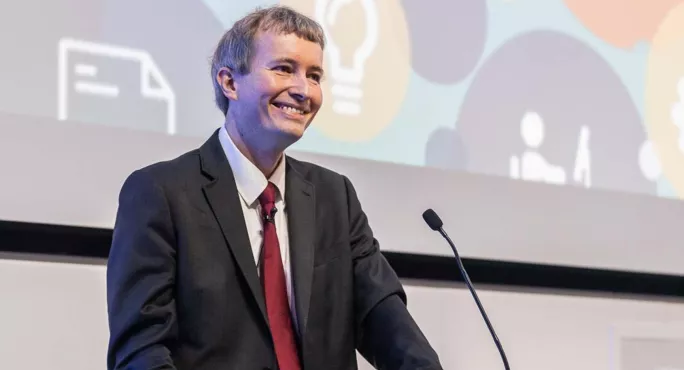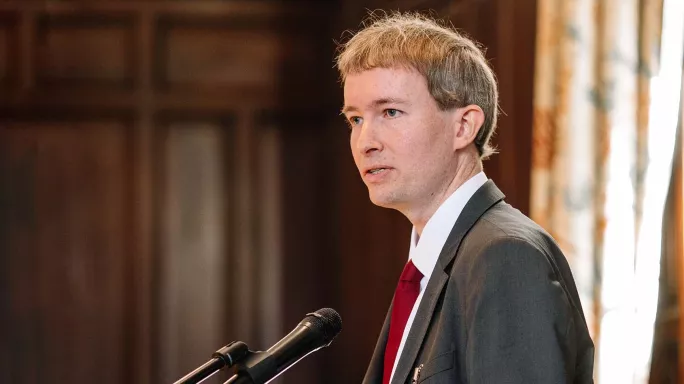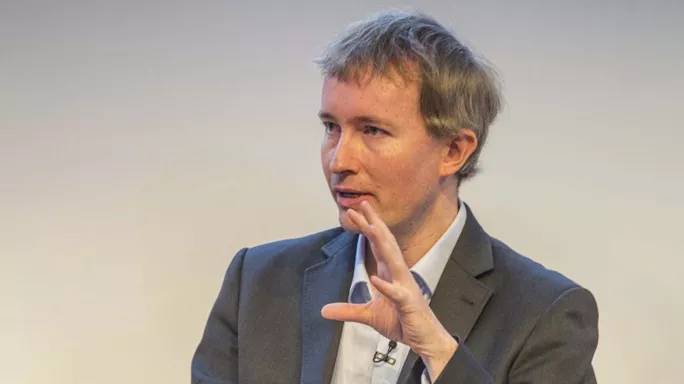
- Home
- Stephen Evans and his mission to make a difference
Stephen Evans and his mission to make a difference

Stephen Evans jokes that as a pupil, he was one of those “annoying people” who really enjoyed learning, having been taught about the power of education early on in his childhood. Growing up in Loughborough, his dad, a local government officer, and his mum, a tax and benefits officer, made it abundantly clear that he was to go to university.
He says he did “reasonably well overall” – both in school and that pursuit of higher education. When his school asked him if he’d considered Oxford or Cambridge, his immediate response was “obviously not” – that was for “posh kids, not for the likes of me”. But then he thought, why not?
Evans was accepted to Queen’s College, Cambridge to study economics. Despite feeling a bit intimidated at first – “It was all a bit Harry Potter, and there were things called cloisters, I didn't know what a cloister was” – he thrived. And it’s his education at Cambridge that he says “opened a lot of doors” and is to thank for his current role as chief executive at the Learning and Work Institute.
It’s a role he’s held for five years – although perhaps no year has been tougher than 2020, in which he’s led the organisation along the bumpy road of the Coronavirus pandemic, publishing research and calling for urgent action to mitigate against the impact the virus has had on education and employment throughout the UK.
But his experience in economics, further education and the world of work more than equipped him for the challenge.

More: Government must invest billions to tackle unemployment
By Stephen Evans: 'This is our chance to build a better society'
Background: Stephen Evans appointed chief executive of Learning and Work Institute
Starting at the top
When Evans was in his final year at Cambridge, he attended one of the university’s “milk rounds”, a big careers fair for students with various employers in attendance. He jokes that he could have ended up anywhere, depending on who was giving away the best free merchandise – but instead, his first postgraduate job was as a policy advisor at the Treasury.
He says he had no expectation of getting the job – going to the interview alone was his first trip into central London.
“I guess I was lucky enough that they were recruiting so many people that I made it over the line. I wanted to work somewhere that I could put my learning into practise and make a real difference, rather just focusing on what it was going to help me to learn,” he says.
“I was very lucky to get in and very lucky to work with some amazingly clever people. They throw you straight in at the deep end, all of a sudden on day one you're in charge of a policy area, which may explain a lot about policymaking. But at that time, there was a real sense about wanting to do something: they wanted some action, reform and change.”
His first policy area was labour market analysis – looking at the employment levels and how to improve them quickly so that the economy then grows. He went on to work on Lord Leitch’s review of skills, which sparked a greater interest in FE, skills and learning. It was on that review that he says that he realised that talent is evenly distributed across the country but opportunity is not.
“There’s no reason why more people from my school couldn't have gone to Cambridge, but there's also no reason why not going to university or going to college shouldn't give you those routes to go wherever you want, either,” he says.
“That's what's informed all those things that I've worked on. You go to a jobcentre and you see the amazing work that advisors do to help people find their career, find their path, you go to college and you see the engagement of young people who haven't enjoyed school, or have and just want to find a different route and go to a training provider as apprentices. I find those sort of individual stories really inspiring. They remind you why you're doing what you're doing.”

Gaining perspective
After five years at the Treasury, a secondment to the Social Market Foundation as their chief economist gave Evans the opportunity to “think more freely” about how he could influence skills and employment policy in England. That role then led to an opportunity at the London Development Agency as the director of employment and skills.
The agency worked with central government but was accountable to the Mayor of London – Ken Livingstone, at the time. He was, however, succeeded shortly after Evans started by Boris Johnson.
“I’m not sure what’s happened to him since...” he laughs, remembering Mr Johnson – now, of course, prime minister. “He was clearly somebody who wanted to do stuff and make stuff happen, and try something a bit different. We had quite a lot of licence to do that from him and then from his advisors that we worked more closely with.”
Evans says that one of the things that sticks out most clearly to him now was the 2012 Olympics skills programme. A lot of the construction workers were previously unemployed and recruited through schemes that Evans helped to set up. He says attending the Olympics in London was “really special”, knowing he’d had that influence.
Evans spent four years at the agency before moving to Working Links, a leading training provider, as the director of policy and strategic development, and then taking the role of deputy chief executive of the National Institute of Adult Continuing Education (NIACE).
The role allowed Evans to bring together all his expertise into one role: influencing policy, commissioning work and working with learning and education providers to test out new initiatives.
Reacting quickly to Covid-19
When NIACE merged with the Centre for Economic and Social Inclusion to become the Learning and Work Institute a year later, Evans was promoted to chief executive. In those early days, he says he was kept awake at night at the thought of being responsible for the livelihoods of his staff. He was also daunted by the history of both organisations: “They’d been around for almost 100 years and I didn't want to be the one who broke it.”
He puts his years in the role – the longest he’s spent anywhere since the Treasury – down to the people around him.
“I'm really lucky. I am contractually obliged to say this but I'm not just saying it, we do have a really great team, and we do work really well together. There are lots of people to pick up the phone to and get some advice or to sit and learn from,” he says.
As a team, they’ve reacted quickly to the developing crisis in education and employment as a result of Covid-19. The organisation has published six reports so far, and collaborated with others across the sector to highlight the scale of disruption and call on the government to make urgent change.
Evans says that while the government acted “really quickly” to mitigate against the worst economic effects of the crisis by introducing the furlough scheme and other initiatives for jobs, much more action needs to be taken.
“I'd like to see a bit more action for those furloughed workers. We have nine million furloughed workers in total. This is a great chance to help them to get into learning, to improve their skills, find new jobs and it feels like we could have done more than we have so far,” he says.
It’s not just the after-effects of Covid-19 that need to be addressed, he says, but all of the pre-existing problems.
“The pandemic is stark and immediate and it isn't necessarily just going to disappear. But we also have all those things that we wanted to do before all of this: the low number of young people doing apprenticeships, the low number of young people getting qualified to level three, the lowest participation of adults in learning on record,” he says.
“I can give you a long list of problems. We can’t lose sight of those. It's really difficult if you're a policymaker because we haven't really been through a pandemic so you can't just do what we did in the last recession, and you do learn as you go. The wheels do turn slowly, but there are areas where we need to accelerate.”

Tapping into the reservoir of goodwill
Going forward, Evans says everything has changed for the Learning and Work Institute – and yet nothing has.
“We're an organisation that's got a social mission: that hasn't changed. We're a charity so we're here to make a difference and the focus is on how we can do that. One of the ways the pandemic changes things a little bit is all of the stories of different community groups making gowns for the NHS, people volunteering and all this sort of stuff. It feels like we've got a real reservoir of goodwill. How do we tap into that and keep that going and build that into a culture of learning and help?
“Whenever I talk to any of our Festival of Learning winners [an award scheme run by the Learning and Work Institute], the two things I hear most often from them is that engaging in learning was like a light being turned on in their head, and that one of the main benefits they got from learning was making new friends and new connections in the community. Community and connection were important to start with and we've seen how important it’s become during the pandemic. The role of adult learning in that is something that's going to be a really big focus for us as well,” he says.
“So overall, the context of our work is different, the imperative is greater, and the focus is: where are the areas where we can make a difference and work with others?”
Register with Tes and you can read five free articles every month, plus you'll have access to our range of award-winning newsletters.
Keep reading for just £4.90 per month
You've reached your limit of free articles this month. Subscribe for £4.90 per month for three months and get:
- Unlimited access to all Tes magazine content
- Exclusive subscriber-only stories
- Award-winning email newsletters
You've reached your limit of free articles this month. Subscribe for £4.90 per month for three months and get:
- Unlimited access to all Tes magazine content
- Exclusive subscriber-only stories
- Award-winning email newsletters



